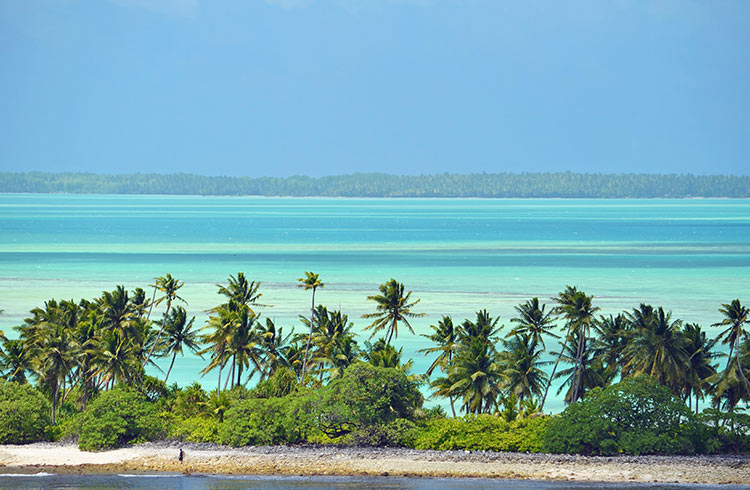Is Kiribati Safe? Essential Travel Tips for Visitors
Poor infrastructure, petty crime, alcoholism and economic strife in Kiribati. Here's what you need to know to stay safe.
 Photo © Getty Images/EvaKaufman
Photo © Getty Images/EvaKaufman
Kiribati is an island nation in the Pacific, halfway between Hawaii and Fiji. Planes don't travel in and out of the island very often, and the ones that do may look like they're seconds from falling apart. Buildings are of the most basic construction, and houses lack common necesseties, such as the humble toilet.
Privacy is considered different here, and you shouldn't be surprised to see people roaming through a random house's backyard – even if they don't live there. Many people walk around with machetes.
Population density is quite a problem. Although there are 33 atolls that make up the country, more than half of Kiribati's population lives in South Tarawa, which sees a 3-percent growth rate each year.
Alcoholism in Kiribati
There are many social problems exist in Kiribati, especially on the heavily-populated Tarawa.
Alcoholism is rife on the atolls, and many of their inhabitants are "bad" drunks who may be friendly when sober, but out of control when they've imbibed.
Drinking is one of the only nighttime activities in which to take part in Kiribati, and locals who do it to excess can get rowdy and violent.
Walking around at night, especially in Betio, in downtown Tarawa, and on the beaches of South Tarawa can welcome random attacks and arguments thanks to drunkenness.
It's not uncommon to see bus drivers and other workers drunk on the job as well.
Partly due to booze, but also partly due to perceived gender roles, lone women may be approached aggressively. Many Kiribati think it's against custom to allow women to travel or walk solo.
Incidences of domestic violence often occur when alcohol is involved as well. In fact, Kiribati carries some of the highest rates of mental, physical and sexual abuse against women in the world. Roughly 68 percent of Kiribati women report suffering domestic abuse at some point in their lives. World organizations have begun trying to put more aid in place for domestic violence victims, educate the community and lower abuse rates, but it's still a problem you might hear or see on your trip.
Poverty and the economy
There are more social and health issues afflicting the island, such as high rates of smoking, 85 percent of residents here puff, diabetes and heart disease and malnutrition.
Poverty and economic strife are other issues with which the Kiribati residents contend.
The unemployment rate is quite high. Aid workers are stationed there, but there's only so much they can do.
Petty crime in Kiribati
Petty crime like theft is also common in Kiribati. Travelers recommend taking taxis home when out at night instead of walking to avoid trouble on the street. Keep your valuables out of sight and be aware of anyone lingering close.
Local laws in Kiribati
There are crimes you can commit as a traveler too. Male homosexual acts are illegal, but female homosexuality is not. The law is not enforced strictly, however discrimination may be an issue for the LGBTQ community. Local laws make it illegal to be nude in public, and it is also illegal to wear skimpy swimwear.
Be aware drug trafficking or possession is a serious offence, resulting in lengthy prison time. Our advice? Don't do drugs in Kiribati.
Simple and flexible travel insurance
You can buy at home or while traveling, and claim online from anywhere in the world. With 150+ adventure activities covered and 24/7 emergency assistance.
Get a quote
4 Comments
This article is so horribly ethnocentric that I could barely finish reading it. This is not what I expect from a travel site.
The other comments are right. Let's just tell everyone that every part of Kiribati is safe and you can go anywhere and do anything you want with no worries. There. No hurt fee-fees.
By the way, you can't have it both ways. You can't be poverty-stricken, claiming to always have made do with very little, and yet complain when an article points out that Kiribati is very poor and people have a hard time of it. What is it you leftists say - that you shouldn't negate someone else's truth? You're obliterating the true experience of Kiribati residents with your whining.
But yea. Everything's great. Kiribati is a paradise and no one ever dies of ciguatera, ever. LOL.
Expect more information about the Kiribati islands, but it is less.
If traveling to Kiribati read the following warnings https://www.osac.gov/Content/Report/71682d55-8e68-4ff6-8019-15f4aec3a581 and more detailed information at https://www.osac.gov/Content/Report/a0739981-fcee-4321-8483-18e7f9c8a7f3
Either reports and statements written here do need warnings and I see that the writers are trying to explain both sides of staying at Kiribati, I see the warnings should be listened to and that travelers take heed of any warning regardless.
The USA Government has written a more detailed link for US citizens.